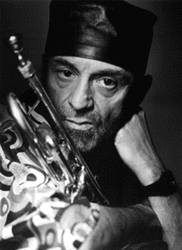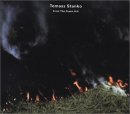

A CONVERSATION
WITH TOMASZ STANKO
DAVE
WAYNE: The titles of your recordings and compositions make numerous literary
and filmic references. You have also written music for plays and films
as well: one of these featured a single theme played in as many different
ways as humanly possible (no mean feat, that!). How did that project (documented
as Balladyna on the Gowi label) come about? More broadly, how do these
other mediums influence or inspire you as a composer and improviser? In
particular, what is it about Krzystof Komeda's film music that fascinates
you so?
TOMASZ STANKO: Yes indeed, various media, such as film, theatre, painting,
literature and poetry, as well as philosophy and humanity, in its broad
sense, have had an effect on me as a composer, improviser, and artist.
That's exactly what always struck me about Komeda, how much his irregular
musical forms were influenced by his involvement with film. Such extensive
multimedia references help me to improvise freely, and improvisation is
my favorite technique, which I use not only to play solos, but to do just
anything (to compose, record, select, etc.).
DW: In the mid to late 1960s, it seems that Poland was an unusually rich
breeding ground for singular, world-class jazz composers and improvisers:
yourself, Krzystof Komeda, Michal Urbaniak, Zbiginiew Namyslowski, Zbiginiew
Seifert, Urszula Dudziak, Adam Makowicz, and many others. Since then,
it seems to me that only a few Polish jazz musicians have broken through
to achieve international recognition on the level that you and your colleagues
have. Am I mistaken? If not, what was so special about those people and
those times?
TOMASZ STANKO: Those were the days. The position of jazz in the Polish
artistic milieu was exceptional. Jazz meant being free and modern, and
was so beautiful. We, jazzmen, were highly ranked, and the creme of Polish
filmmakers, visual artists, actors, and writers simply spoiled us. We
were having more personal contacts with the West than others and that's
perhaps why jazz attracted the most creative and prolific musicians.
DW: Are you still intimately involved in the music scene in Poland? If
so, are there any new (or old) improvisers that we should keep our eyes
and ears open for? What is the jazz scene in Poland like these days?
TOMASZ STANKO: Today, the most interesting is the youngest generation
and some of them, such as pianist Marcin Wasilewski or drummer Micha Mikiewicz,
are excellent. Of older players I particularly appreciate keyboardist
Janusz Skowron and reedman Tomasz Szukalski.
DW: How did you get started on the trumpet? I hear Chet and Miles in your
playing, but are there perhaps other important influences? Are you influenced
by more avant-garde players, such as Bill Dixon, for example? Your trumpet
sound is immediately recognizable: not just your choice of notes or your
phrasing, but its actual sound. There is a raspy, buzzy sort of sound
that you get that I've never heard anywhere else. Was this the result
of a concerted effort on your part (like Mangelsdorff and his multiphonics),
or did it just happen?
TOMASZ STANKO: You've hit the right note. Chet was indeed my first trumpet
love, followed by Miles, who continued as my guru until his very end.
Miles has been the major influence on me, first of all as leader and artist.
I've been also affected by Coltrane, trumpeters Brownie, Kenny Dorham,
Fats Navarro or Booker Little, and also by Max Roach, Sonny Rollins, and
Don Cherry. As far as my sound is concerned, I believe that Van Gogh,
Coleman Hawkins, Faulkner, Roy Eldrige, Modgiliani, Burroughs, and Buck
Clayton might have helped in its buildup.
DW: CD reissues of your earlier ECM LPs (Balladyna for example), Music
for K, Twet and of course your recordings with Komeda are now widely available,
and I must say that a lot of this music is very impressive and inspired.
Even so, a lot of artists would rather we pay more attention to what they
are doing now. How do you feel about the wider availability of your earlier
recordings?
TOMASZ STANKO: I don't know whether my old recordings are widely available,
really, but that they have been reissued on CD is important for me, since,
matter of fact, all my life I've been playing the same one song.
DW: Are you still working with the quartet that recorded Bossanossa (on
Gowi), Leosia and Matka Joanna (for ECM)? How did the group on From the
Green Hill come together? Is this a working, touring group? The combination
of you and Surman is wonderful enough, but Saluzzi and Michelle Makarski
add another level. Truly a unique sound! Please comment on how the group
that recorded From the Green Hill evolved. I especially enjoyed Dino Saluzzi's
contributions: you and he seem to be kindred spirits. Is this a correct
impression?
TOMASZ STANKO: The Green Hill band was intended as a studio outfit and
no live performances were originally planned, but this May we played a
short tour in Poland and two festivals Jazz Fair in Poznań and Jazz Baltica
in Germany. This band is founded on concord and contradictions, so it
can evolve in any direction. Surman's personal sound and mine, combined
with bandoneon and Michelle's classic violin enable enormous coloristic
potential, while distances between Dino's, Surman's, and Michelle's aesthetics
provide unpredictable tensions, glued together with Slavic lyricism and
reverie in Scandinavian timing. The quartet, featuring Bobo and Anders,
is my regular band. I'm contemplating to swap Tony for a different drummer,
more conventional and of different sound and timing.
DW: You made some electronic (Freelectronic) and fusion-jazz (Lady Go,
C.O.C.X.) recordings in the late 1970s and early 1980s. Since then, to
my knowledge, you have played exclusively with acoustic backing. Any thoughts
of trying electronics again?
TOMASZ STANKO: Positively yes. I'm thinking of an affair with electronics
in contemporary time patterns.
DW: Do you plan to make an appearance in the United States anytime soon?
If so, where and with whom? If not, is a European tour in the offing?
TOMASZ STANKO: I'm looking forward to the privilege of a US appearance
as soon as possible - nothing is confirmed yet.
Dave Wayne is a Staff Contributor for Jazz Weekly. Comments? Email
him.
